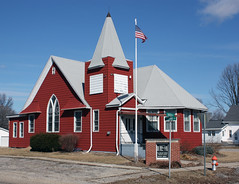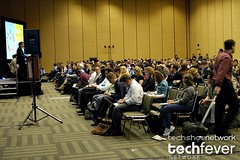Finished reading Charles Finney's memoirs published in 1876 last night. Much of the book focuses on his plea for innovation for the sake of evangelism. On a recent trip to California, I stopped in a religious store that sells a largely unsorted collection of used books. I was looking for treasure, and I found it.
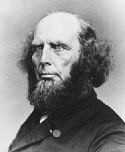 Charles G. Finney. Image via Wikipedia
Charles G. Finney. Image via Wikipedia
On the floor and at the end of a row of "overflow" books that would not fit on an already overstuffed bookshelf I found an unassuming green book, yellowed with age and frayed at the spine. The square-ish little bundle had a simple title: CHARLES G. FINNEY - and that was enough for me.
The 477 page book, complete with a portrait of the famous evangelist, turned out to be a first edition of his autobiography, a book published by
Oberlin College (a school built almost entirely on his reputation, fundraising, and booksales) after his death in consideration of the great importance of his life.
The book is a fascinating read. For me, the value of the book is to see Finney's own view of his theological convictions and his methods in his approach to gaining converts. Finney is the original seeker-sensitive preacher.
Toward the end of the book, Finney writes,
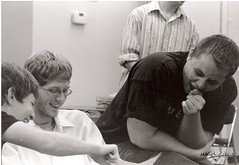 Image by Nate KS via Flickr
Image by Nate KS via Flickr
"In religion as in every thing else, good sense and sound discretion will, from time to time, judiciously adapt means to ends.
The measures needed will be naturally suggested to those who witness the state of things, and if prayerfully and cautiously used, let great freedom be given to the influences of the Holy Spirit in all hearts."
[emphasis mine.]
His call for "great freedom" comes as a striking, summary statement after reading the many, many stories of conversion and revival. In short, the book is a plea to earnest Christians for innovation in the service of evangelism.
Finney often uses terms like "calculation," "means," and "measures" throughout the book that indicate his conscious consideration of methods to provoke conviction and move people to make public commitment toward the gospel.
Indeed, for Finney the lack of revival in any place pointed to a lack of consideration of proper methods. On page 155, he writes, "The great failure of the ministry and of the church, in promoting religion, consisted, in great measure, in the want of
a suitable adaptation of means to that end." And on page 154 he writes, "There must be an
adaptation of means to the end to be secured," namely conversion.
The means-end discussion is constant through the book, both in its successes and in its failures.
 Finney "invented" the altar call. Image by openg via Flickr
Finney "invented" the altar call. Image by openg via Flickr
Here's one of his most important methods -- many of you may remember that Finney essentially invented the "altar call," the practice of preachers summoning attenders to move to the front of the service as a sign of their dedication to Jesus and meeting others there who will talk and pray with them, giving them spiritual assurance.
The book tells stories regarding his first use and continual experimentation with altar calls and the use of "the anxious seat" to provoke people to commitment.
Finney's practice was to arrive in town and spend much time living there, even two or six months at a stretch, getting to know people and speaking to them as directly and as plainly as possible.
Although he was criticized by both members and ministers for the failure to use a more religious oratory style, Finney strenuously argued that he would rather be understood than thought merely eloquent.
On page 94 he writes,
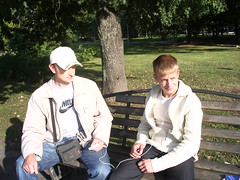 Image by Dave Siberia via Flickr
Image by Dave Siberia via Flickr
"My habit has always been to study the Gospel, and the best application of it, all the time. I do not confine myself to hours and days of writing my sermons; but my mind is always pondering the truths of the Gospel, and the best ways of using them. I go among the people and learn their wants. Then, in the light of the Holy Spirit, I take a subject that I think will meet their present necessities. I think intensely on it, and pray much over the subject on Sabbath morning, for example, and get my mind full of it, and then go and pour it out ot the people."
Finney's preaching was more like a conversation. "How completely they were in the dark in regard to the results of that method of addressing people!" he wrote. "The used to complain that I let down the dignity of the pulpit" and "that I talked to the people in a colloquial manner."
Finney usually spoke extemporaneously, speaking from a brief outline, in order to talk to the assembly with the greatest freshness and spontaneity possible. "Indeed, people have often said to me: 'Why, you do not preach. You talk to the people.'" This is one of the ways his "preaching" was set apart from the well-prepared, written-out, and read-aloud sermons of his contemporaries.
He later summarized his ministry, saying,
"Wherever I went, the word of God took immediate effect; and it seemed only necessary to present the law of God, and the claims of Christ, in such relations and proportions as were calculated to secure the conversion of men, and they would be converted by scores."
 Finney practiced and continually called for deep prayer for revival, and always attributed the work to the Holy Spirit. Image by Sacred Destinations via Flickr
Finney practiced and continually called for deep prayer for revival, and always attributed the work to the Holy Spirit. Image by Sacred Destinations via Flickr
Finney "called" people to public affirmation of faith in the context of an understanding of their local cultures and common concerns at home and at work.
But don't think that Finney believed conversion was merely an outcome of human manipulation -- far from it. Finney spends much of the book (and writings in other books) talking about the centrality of prayer for revival. And Finney attributes nothing to his self, rather to the efficacious working of the Gospel when properly presented.
It is the work of the Holy Spirit according to Finney. The difference between himself and most of his contemporaries is that they failed to properly understand the working of the Spirit and failed to call individuals to take responsibilities for their personal, active response to the Gospel.
 For Galli, evangelicals may appear successful, but actually they have "succumbed" to "an emotionally and spiritually shallow culture."
For Galli, evangelicals may appear successful, but actually they have "succumbed" to "an emotionally and spiritually shallow culture." Image by cromacom via Flickr
Image by cromacom via Flickr Image via Wikipedia
Image via Wikipedia
















